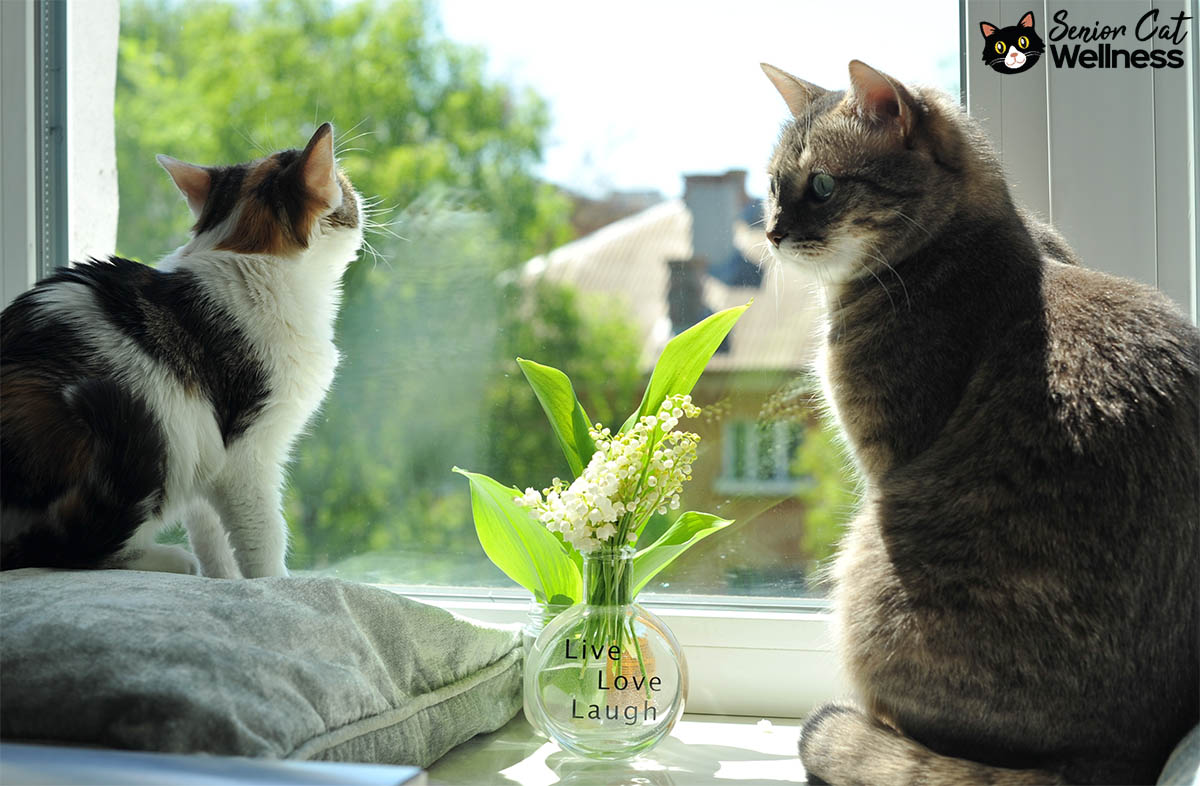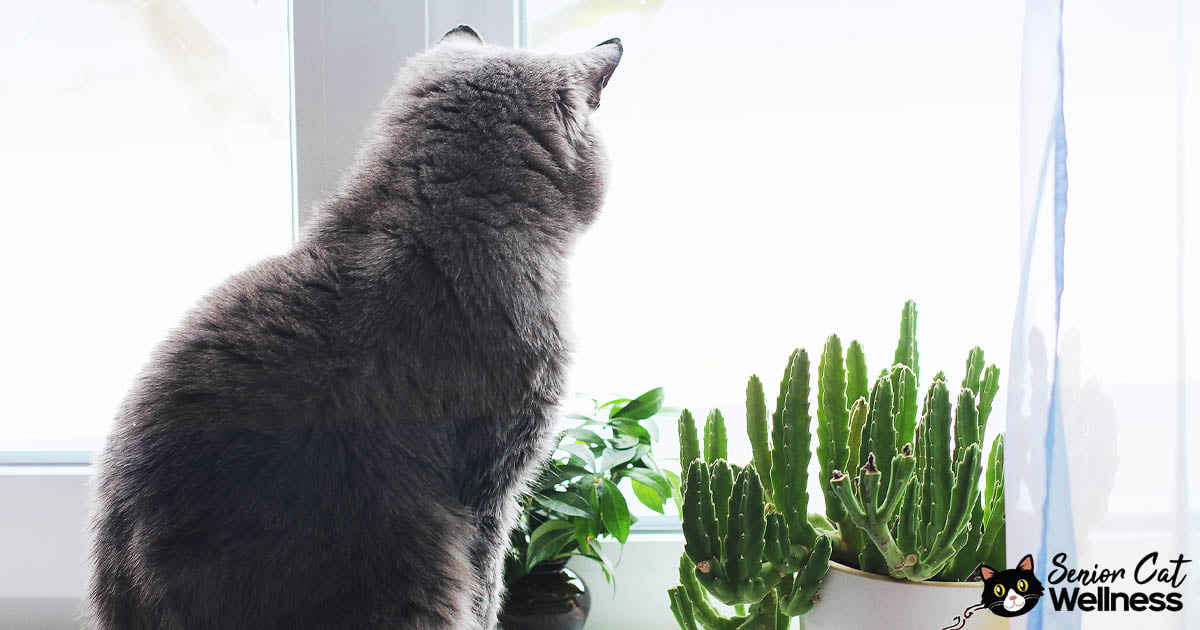Felines can be a mixed bag. Some cats rush to meet you at the door, while others won’t even bother to get up from their nap to give you a second glance!
When you’re on vacation, however, your cat may very well miss you. Before you head off, make sure that the appropriate measures are in place to prevent kitty stress, anxiety, boredom, or property destruction.
In this article, we’ll talk about:
- Common behaviors that indicate your cat missed you
- What separation anxiety looks like in cats
- How to care for your cat when you’re away.
There are some trips cats simply can’t attend. Read on to learn how to make their time without you easier!
Prefer a Video?
Do Cats Miss Their Owners When They’re Away?
Cats are usually very independent animals. They’re more than happy to be alone for certain periods, opting for long naps under the sun.
You might notice that they’re smoochy when you return, but most of the time, they really don’t mind being alone for a while.
However, some cats are especially clingy or affectionate, forever wanting attention from their owner. These cats, in particular, may struggle without you.
A ripped sofa or vomit on the carpet when you return can indicate that your absence was a stressful experience!
Top Signs That Your Cat Missed You
Vocalizing More Than Usual
If your cat meows more than normal when you return home, they’re probably catching up on the lost conversation.
Maybe they’re voicing their distaste at your leaving or making sure you’re paying attention.
Increased Affection and Seeking Attention
Returning to an extra cuddly cat likely means they’ve missed you. Being more affectionate than usual is a sign that they want to make up for the time you lost together. Make sure you offer plenty of pets and scratches.
Following You Around the House
If your cat follows you around when you get back home, it’s to keep track of you. Cats enjoy a certain level of control, and that includes keeping close tabs on you.
Unless you leave and return on a regular schedule, your cat won’t know when you’re coming back. That’s why they become your little shadow — to make sure you’re still there!
Purring and Kneading on Your Lap
When your cat starts purring, it’s a good sign they’re happy to have you home.
Even better, they’ll start kneading your lap – rustling up a batch of kitty biscuits in the process. If your lap has been chosen, enjoy it. You’re the object of your cat’s affection!
Rubbing Against You and Marking Territory
If your cat rubs against your legs, they’re both greeting you and marking you. This is a good thing — it means they’re happy to see you return. Or, perhaps they’re asking for a treat?
Your cat may have “marked its territory” (i.e. urinated around your property) when you were gone. The smell of the urine wards off nearby cats and helps your cat feel safe.
Of course, urinating can become an issue when it happens indoors. Having a clean litter box and stress-relieving techniques in place can help prevent this.
Displaying Excited Behavior Upon Your Return
When you open your door, your cat might run to meet you or jump up excitedly to say hello. This is a clear sign they’re thrilled to see you again.
Not all cats stoop to this dog-like behavior, though. If yours doesn’t, take solace in the fact that cats are simply proud creatures.
Bringing You Gifts (Such as Toys or Prey)
Nothing says “I missed you” like a dead mouse or a favorite toy.
If your cat gives you their toy, they’re trusting you with an important possession. If they bring you a dead animal, they’re proving their hunting skills and their love for you.
Excessive Grooming or Licking Your Hands or Face
Cats groom themselves to stay clean and self-soothe. When faced with stress, they may over-lick certain areas and cause redness or hair loss.
It’s strange (but cute) when your pet decides to lick your hands, face, or hair. Take it as a nice gesture — your cat is bonding with you, keeping you neat and tidy, and appreciating your return.
Sleeping Near You or on Your Belongings
If you wore a disguise and passed your cat on the street, they’d instantly recognize you. Why? Because of your scent.
Your cat may seek comfort in a pile of clothes or with you in bed. It’s a way for them to feel cozy among familiar smells.
Displaying Signs of Anxiety or Restlessness When You’re Away
Some cat owners return home to shredded toilet paper, smashed vases, vomit, or worse.
Unless you have cameras installed or a neighbor popping in to check on your cat, you won’t know how they’re feeling until you get home.
These concerning acts are often a result of anxiety. Don’t rush to discipline your cat — first, understand that they might have struggled without you. The next time you go away, put measures in place to try to prevent separation anxiety.

How Long Do Cats Miss You?
This timeframe is difficult to pinpoint. Particularly anxious cats may start howling the moment you’re gone, whereas others will remain unbothered for days.
How long your cat misses you depends on the strength of your bond, the length of your trip, and how much your cat trusts you.
The bond between cats and their owners is wonderfully complex. To learn more about it, have a look at this recent study on the topic.
Handling Your Cat’s Separation Anxiety: Top 6 Tips
Gradual Desensitization to Being Alone
Your cat might initially perceive being alone as a scary thing. To change that, you can slowly put in place measures like gradual desensitization.
First, figure out how long your cat can be comfortably alone. Then, slowly step out of the house for short periods.
Leave them with a comfortable napping spot and some toys for entertainment. When you return home, check in with them to see how they coped. Offer lots of pets!
Ideally, after slowly increasing the time you’re away, your cat will become more comfortable with being alone. This technique works best in conjunction with one or more of the following strategies.
Providing a Safe and Comfortable Space
It’s essential that your cat has a clean, enriching environment.
Before you head out the door, organize a bed, water and food, toys, something to scratch on, and a litter box. You could leave an item of clothing with your scent on it for your cat to sleep with.
For holidays longer than 24 hours, enlist someone to pop in and replenish these resources as needed. This will ensure your cat is looked after and not totally alone.
Using Interactive Toys and Puzzles for Mental Stimulation
Your cat needs entertainment, just like you do. Give them toys and puzzles so they stay occupied while you’re gone. Younger cats with more energy will need all your artillery.
Food puzzles are a great idea. Your cat has to figure out a puzzle to get to a treat, which takes up time and energy.
In fact, research suggests that food puzzles are particularly beneficial for your feline friends.
Establishing a Consistent Routine
Cats are creatures of habit who need a stable routine. To keep them happy and healthy, don’t pull any surprises.
Try to feed your cat at the same time every morning and evening so they know what to expect. Schedule attention, games, and outdoor play at roughly the same times every day.
Getting a Cat Sitter
Hiring a cat sitter (or just asking the neighbor to pop in) is necessary if you’re going to be away for a while. The sitter will feed your cat, clean their litter box, and give them company and medication if needed.
Try to get the same person each time so your cat becomes familiar with them. That way, they’ll be up for socializing. After all, having a friend enter their space is far better than having a stranger.
Utilizing Pheromone Products or Calming Aids
Very anxious cats need a little extra help to calm their anxiety. You can try a pheromone air diffuser, which releases artificial pheromones that reduce stress. Cats release pheromones when they rub up against you, which is a positive experience.
Other calming aids include compression vests, medication, special food, and environmental tools like a dark, covered cat den. It’s best to work with a vet about which strategies might work best.


You would think my female cat, who is a solitary non affectionate soul, would be okay when I go away and my needy over affectionate male cat would pine.
Its the other way round.
My so called independent female cat pulls all her hair out, even if my partner has stayed at home.
One week of me being absent results in my female cat overgrooming herself. Even three weeks later, me having a night out results in returning to an anxious cat, who has pulled another bald patch.
This often leads to false fears of ring worm.
I end up anxious myself, wondering what else I can do to ease her mind.
The only real solution is to remain calm and try to distract her, play, treats etc. I also use a spray near her nests, not mentioning a brand, which relaxes her.
I only went away for 7 days last time nearly four weeks later, the random hair pulling continues.